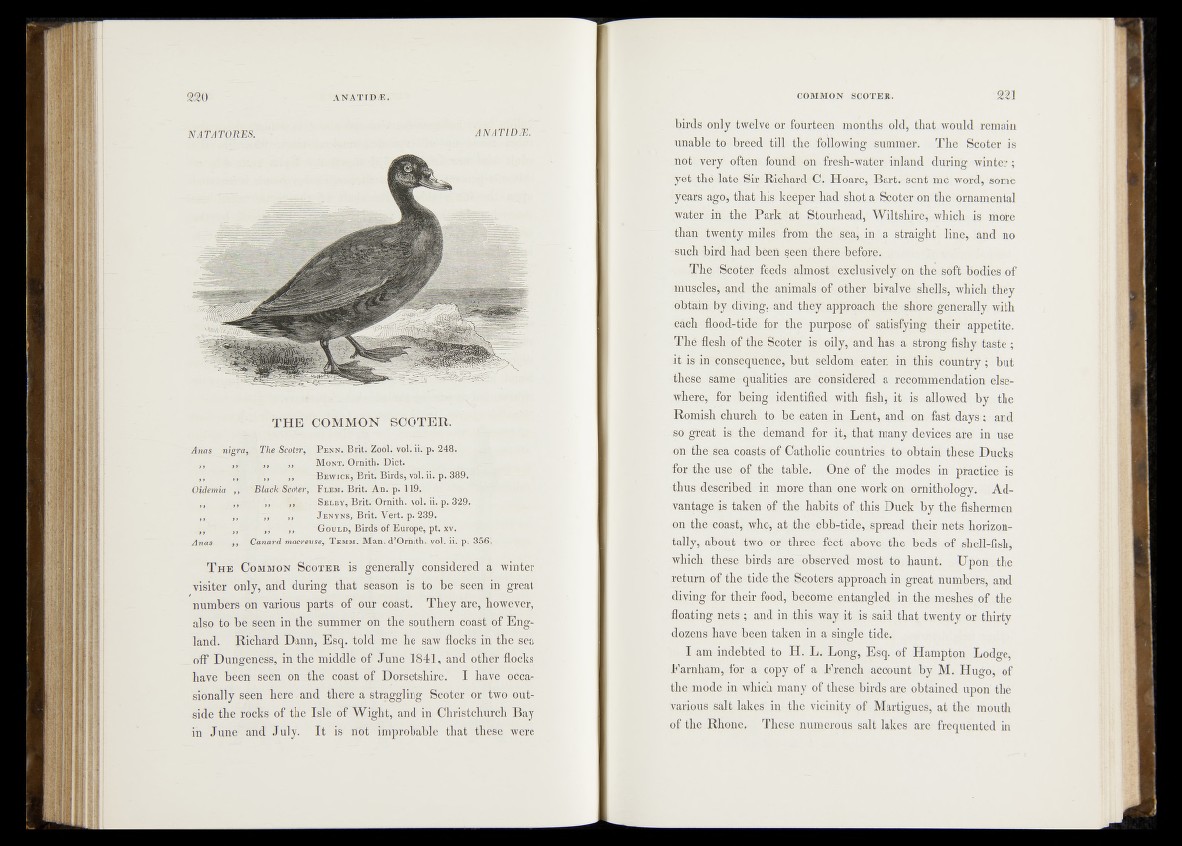
NATATORES. AN ATI DM.
T H E COMMON SCOTER.
A n a s n i g r a , T h e S c o t e r ^ Brj,tx Zool. v%Uii'.fp. %4,S,
„ jjf. „ „ MotNqvOrmth. Diet.,
,, ,, » „ -B ewick* Brit. Birds, vol. ii. p 3@1|[
O i d e m i a 'B I d c f c S p p t e r , Fxekc. Brit. An. p. 119.
■ I iSELBY,-Drit^0rnith. vol. n."p. 329. I
Bril. 'P e rt. p . '2 3 S p ~
" ''tx^LD, Birds*O f Eifrope} pf, xv.
A n a s \ , y . ( J a n a r d m a c r e n s e , Temm. Maijid’^rpithtvol. ii.jp. &Ml -
T h e C ommon S coter 'W-\ generally 'considered a winter
visiter only, and during that’ season is-to be seeif in 'great'-
numbers on various parts of „pur cOast. They fire, howfever;
also to b e ’^een. in the "summer'll the southern coa§|,^f England..
pichard Damn, Esq.doldr^tee he saw flocks in the sea
off Duiigenei®, in the middie of June" 1841, and other flocks
have been- sfeeit on .the c.oast of Dorsetshire/ I haye^ occa^
sionally seen he||r?and there U-ftfaggling Scoter -or two out-
side the rocks of the Isle df.^Vight, and in ChristcMrch Bay
in June and July. It is Hot improbawe that these were
birds only twelve or foürteen months old, that would remain
unable to breed till-the following summer. The Scoter is
.jiot-f/yery often foufid on fresh-water inland during winter;
yet thé lute Sir Richard jC, Hóare, Bart, sent mé word, some
^years ago,'that his keeper had shot a Scoter on the ornamental
water in Phe Park rat StourheUd, Wiltshire;-which is more
-than ,twen.ty^miles‘ from thei {§£% in a straight:? line, and no
*such bifd had been, seenf thér|^before.J ;
Thp^'Sèdterxfeé%f|almostrexelusiV,ely; on the soft bodies of
mu^cleS,'?and the animals ofrpther bivalve' shells, which they
obtain by divingy-Und- they’ approach the shore,.generally with
„each .flood-tide fpr^Jhe -purpose-‘óf »satisfying their' appetite.
Thé flesh, of-tfe^eotter, is,oily, and has a strong fishy taste ;
4 $ is(inconsequence, but seldom, eaten in this country; but
tbd&e :same*qualijii^iare considered a; recommendation else-
whe|g|4for being^ identified with fish, it is allowed ! by the
Romish church to ^ .e a te n in; cLent, and ,o*n -fast days; and
p o d i fi&bthe demand for it, that many devices ate in use
on- the^sea „coasts of Cathofe Countries*, to obtain these Ducks
for the table. One of the modes in practice is
thus described in more than one work on ornithology. Advantage
is taken of the habits of .this Duck by,.the fishermen
on thepóast,- wh^j^at the pbb-tide, spread their nets horizontally^
about two or; three féet'. above the beds of shell-fish,
which, these birds areTobseryed most- tpa haunt. Upon .the
Jetum of the tide the Septqrs- approach in great numbers, and
diving for their food, becorn^entangled in the meshes of the
floating and in,this way it is said that twenty or thirty
dozens haVe been taken in alsmede tide« •
, I am indebted to H. L. Long, Esq. of Hampton Lodge,
Farnham,-for a |ppy-Jpf‘ a French . account by M. Hugo, of
fihemaode in which many of these birds are obtained upon the
various salt lakes" in the vicinity of Martigues, at the mouth
of the Rhone, These numerous salt lakes are frequented in